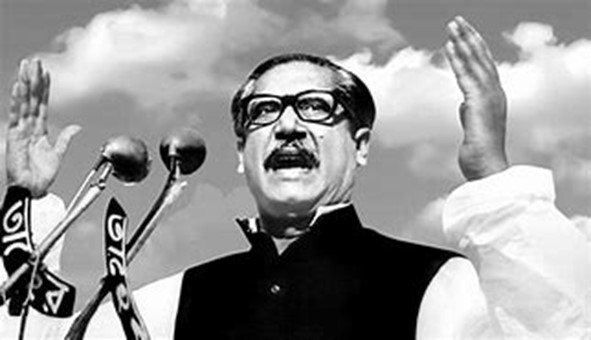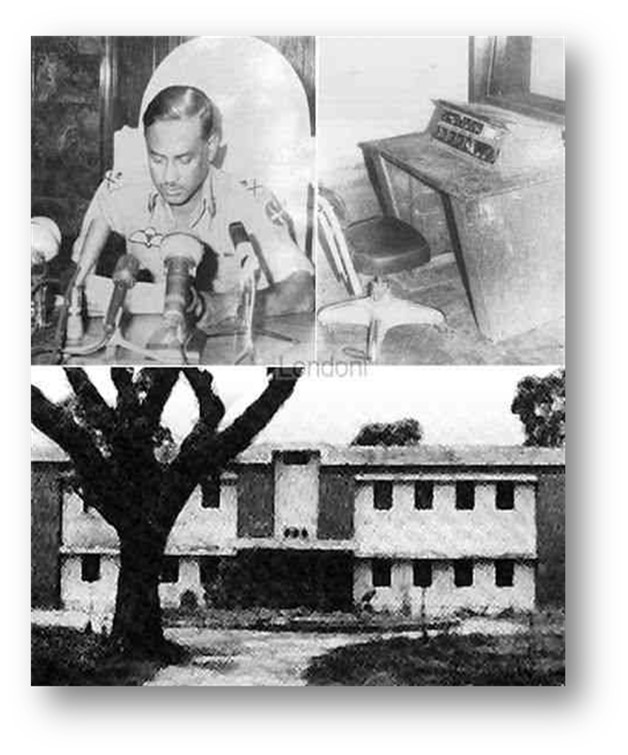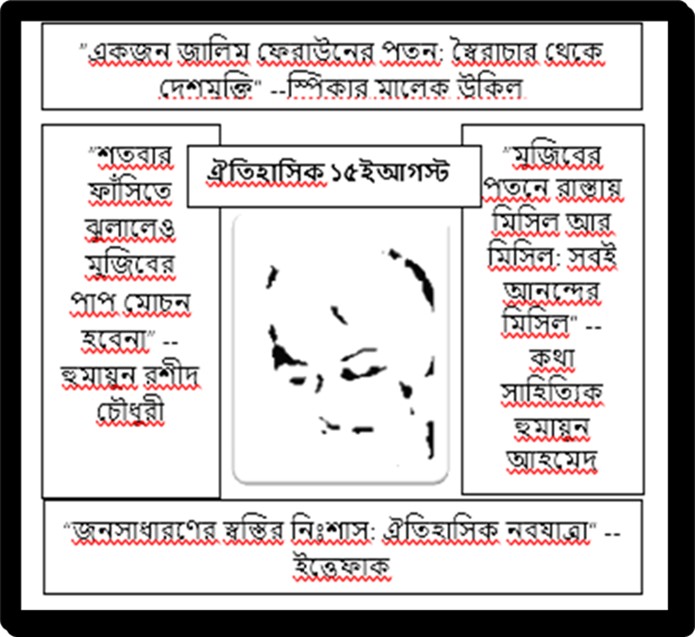
Come August, Sheikh Hasina of Bangladesh tries to bring her father Sheikh Mujibur Rahman, who fell out of grace 49 years ago, to life with unprecedented fanfare. Amidst the ongoing national crisis generated by the aggrieved students against her administration, there was no exception.
Prelude
After ordering Operation Searchlight aimed at “teaching Bengalis a lesson,” President Yahya Khan and his cohorts secretly left Dhaka in the afternoon of March 25, 1971. Within hours, his military swung into action to commit a genocide. A few thousand unarmed, innocent Bengalis were gunned down in the first sweep, with extensive collateral damage. Hitherto brave and loud-talking in terms of Sangram (Struggle/Fight), Mukti (Freedom) and Odhikar (Rights) for decades, Sheikh Mujibur Rahman fled the scene. Tajuddin Ahmad, Secretary General of the Awami League (AL), and other leaders repeatedly requested him to declare independence, go into hiding and join the war of independence. He did neither. “Pakistan will use this as evidence of treason against me,” he retorted on the suggestion for declaring the independence. (Ref: Tajuddin Ahmad, Neta O Pita by Sharmin Ahmad, Oitijjhya, Dhaka, 2014).
Under a secret arrangement with the military, through US Ambassador Joseph Farland, Mujib surrendered and most other political leaders went into hiding. (Ref: Witness to Surrender by Siddiq Salik, the Oxford University Press, Karachi, 1977). Mujib was flown off to West Pakistan and his family was housed at No. 18 Dhanmondi, Dhaka under military protection. They received royal treatment when the rest of the state became a Killing Field. Zoglul Husain, a renowned political analyst and a liberation war organizer in 1971, asserts, “On the night of 25 March 1971, Mujib became the first collaborator with the Yahya regime, and a national traitor since then.”
Back in Karachi, the president had his story to tell in a televised address to the nation. He put the blame squarely on Mujib for the showdown. Not a word was spoken about “Operation Searchlight” and the start of the massacre in East Pakistan. However, the people and the world soon found out.
On March 28, 1971, the New York Times put the two-day death toll in Operation Searchlight at 10,000. Four days later, that same daily newspaper said 35,000 were killed in Dhaka alone. The Sydney Morning Herald of March 29, 1971, estimated the number: 10,000 – 100,000 killed. The International Herald Tribune (IHT) on March 30, 1971, quoted an eyewitness who gave the number murdered in Dhaka at 7,000. The Daily Telegraph on March 29, 1971, reported, “The shelling of the capital Dhaka has been cold-blooded and indiscriminate, although there was almost no sign of armed resistance.” According to the New York Times of April 12, 1971, “It’s a veritable bloodbath. The troops have been utterly merciless. It was like Genghis Khan all over again.” A month later, the Times reported, “80,000 Punjabi and Pathan soldiers slaughtered an estimated 300,000 Bengalis by the end of April.”

Thirty hours later, on March 27, an announcement came from the Kalurghat Radio Station in Chittagong:
“I, Major Ziaur Rahman, hereby declare the independence of the Republic of Bangladesh. As the temporary Head of the Republic, I call upon all Bengalis to rise against the attack by the West Pakistani Army. We shall fight to the last to free our motherland. By the grace of Allah, victory is ours.”
(Major General (then Major) Ziaur Rahman, the radio room at the Kalurghat Radio Station, Chittagong)
The disoriented people of East Pakistan received their direction and started the war of independence. The Pakistan military surrendered on December 16, 1971. Bangladesh won independence at a great cost.
Sheikh Mujibur Rahman, His Rise and Fall
With the declaration of 6 Points in 1966, Sheikh Mujibur Rahman’s popularity continued to rise. The Bengalis of East Pakistan thought they found a voice to redeem their rights and Mujib became their sole mouthpiece. After release from custody in the Agartala Conspiracy Case (ACC) and the subsequent failure of President Ayub Khan’s Round Table Conference (RTC), Mujib became the supreme leader in East Pakistan. Respected and elderly leader Maulana Abdul Hamid Khan Bhasani of the National Awami Party (NAP) had a significant contribution in the rise of Mujib, whom he considered a dear disciple. First, Bhasani was the key figure behind organizing the Mass Uprising of 1969 (ঊনসত্তরের গণ অভ্যুত্থান) under All Party Students Action Committee that led to the fall of Ayub Khan. Second, he led the successful anti-ACC movement and release of Mujib. Third, he declined to join Ayub’s RTC, preempting its failure. Fourth and the most important, his NAP, a considerable political force at the time, declined to participate in the military-conducted elections in 1970, leaving the field exclusive to Mujib and his Awami League. (Incidentally, Bhasani was the founding president of the AL in 1949). The AL won absolute majority in both the National and Provincial Assemblies, under President Yahya-adopted Adult Franchise.
Obsessed with electoral victory, Mujib failed to play his cards judiciously, particularly with the junta which still held the decisive authority. He started behaving as if he had become the supreme leader/Prime Minister of Pakistan, and could dictate the generals regarding the future course of the country. But the junta had the last say and unleashed the military on the Bengalis.
Led by the Bengali elements of the military and joined by Para-military Rifles, Police, Ansars, teachers, students and others, the liberation war started, winning victory in December 1971. India provided much needed sanctuary and logistical support to the Bengali fighting forces, its own military joining the active war on December 4, after Pakistan attacked its western fronts the previous day.
Released by Pakistan, Sheikh Mujibur Rahman returned to Dhaka in January 1972 and quickly claimed the ownership of the newly independent country. The 44 months of his administration was a pathetic episode for the country. Mujib fought for democracy, freedom and people’s rights all his life but once in power, he destroyed all those values and became one of the worst authoritarian rulers. He became the most hated.
Well-known Indian journalist Khuswant Singh wrote in the Illustrated Weekly of India that Mujib was once the most-loved man by his people. Soon he lost touch with them and “lived in a cocoon of self-spun esteem.” He didn’t know that the very people who called him “Bangabandhu” to his face, called him “Banga Satru” behind his back.
“When the bourgeoisie sees that power is slipping out of its hands, it brings up fascism to hold onto their privileges.”—Buenaventura Durruti (Spanish revolutionary)
Unable to control the growing opposition to his rule, he unleashed a reign of terror with his draconian Rakkhi Bahini, militant party cadres and its student factions. These forces killed more than 30,000 patriots and sent another 62,000 to rot in the jails. In the man-made famine of 1974, one and a half (1.5) million people perished directly and indirectly, even though there was no dearth of relief foodgrains. Yet, during such national tragedy and widespread hunger, people witnessed the royal style wedding of the two Mujib-sons and his own lavish birthday celebration in 1975. The heightened corruption in the party and administration earned the demeaning title of “Bottomless Basket” for the country. He arbitrarily changed the constitution to make himself the all-powerful President. Yet not satisfied, he clamped Emergency to ban politics, gag the media and suspend fundamental rights. The last nail was hammered on the virtual coffin of the nation in January 1975 in the form of the socialist style one-party dictatorship through Bangladesh Krishak Sramik Awami League (BAKSAL). All other political parties were dissolved.
Common people were groaning under Mujib’s extreme repression and dictatorial rule. As all regular and constitutional means for a change were sealed, they looked for divine assistance, which came in the form of a military coup staged by a group of Young Turks on August 15, 1975. Instantly, the entire military and the whole nation came out in full support for the coup. Unfortunately, in the short military action, Mujib and most of his family members and a few others died. But the city streets and the whole country saw an unprecedented jubilation and celebration at the fall of Mujib. No tears were shed, no remorse was heard, no challenge was seen anywhere in the country. People even refused to participate in Mujib’s final rituals.
Conclude

(Above logo is borrowed from the writer’s book post-Independence Bangladesh)
“His strolls around the corridor of power at times drew pity; he frowned at straight talk; he tried to destroy dissidents with his wrath. He loved the nation, yet he betrayed it. He had to pay with his life.”
— Enayetullah Khan, a former minister, ambassador and journalist.

